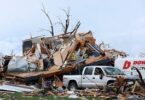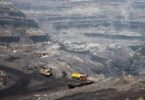Sareen Habeshian
The millions of Americans who migrated to the Sunbelt over the past decade are now stuck in the middle of this summer’s brutal and record-breaking heat wave.
Why it matters: The country’s fastest-growing region is enduring some of the highest temperatures in the U.S., threatening the health of some of America’s most vulnerable people and billions in economic activity.
What’s happening: America’s population — attracted by lower taxes, bigger homes and lower cost of living for retirees — is moving to more vulnerable locations, where the effects ofclimate change present huge risks.
The big picture: Many of the fastest-growing U.S. metro areas have well-known risks. Some don’t have enough water to support their large populations. Others are in the path of hurricanes and other natural disasters.
- The heat this year — and the prospect of hotter summers in the future — has made those risks ever more apparent. But it hasn’t been enough to deter Americans from moving to the region.
- Over the past decade, the Sunbelt accounted for 75% of U.S. population growth. The region is now home to about 50% of the nation’s population.
💬 Zoom in: Axios’ readers from across the nation shared why they stay — or want to leave — their Sunbelt state, despite the cruel heat.
- David B. moved to Phoenix in 2018 to be closer to family. But this summer’s “absolutely brutal” heat, coupled with skyrocketing prices, is pushing them to consider a move back to cooler climates.
- Cam H., who has been living in Houston since 1988, said if his entire career wasn’t tied to the city’s energy and power generation, he would “definitely be looking to get out of here.”
- Laima B., who moved to Houston from Missouri in 2015, said she’s looking to go back north due to the heat and concerns about the strength of hurricanes. “I’ll take Tornado Alley over the ginormous destructive Gulf-fueled hurricanes any day!”
The other side: Tracee L., who moved to Atlanta from Portland, Oregon, this summer, said she doesn’t have any weather regrets. While her electricity bill might creep up, warmer winters will compensate for it.
Between the lines: The issue isn’t just about how hot it is now — but about how much hotter it’s going to get and for how long each year, said Parag Khanna, chief executive of Climate Alpha, a startup that uses AI to measure climate resilience.
- Heat isn’t the only climate risk states are facing. Florida, for example, is more vulnerable to hurricanes than temperature risks and heat waves.
Threat level: With more severe and frequent extreme weather events, a climate housing bubble threatens to erode real estate prices in much of the U.S. in the coming years, Axios’ Andrew Freedman reports.
- Khanna notes there are still climate-resilient options in the Sunbelt, including Raleigh, Charlotte and Dallas.
Courtesy: (Axios)







